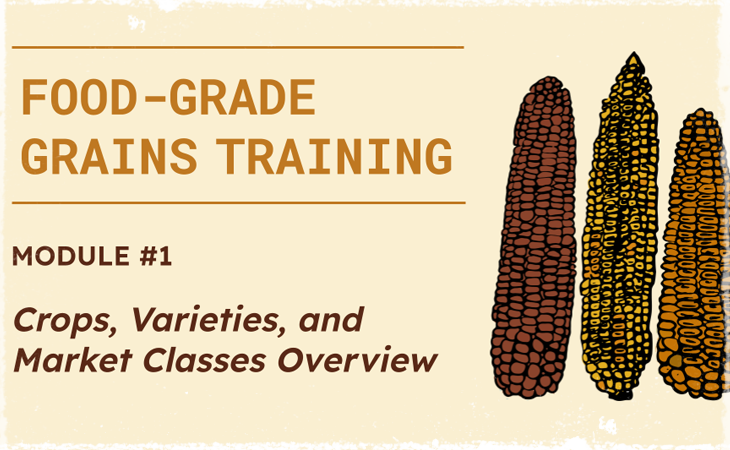Moving grains from farms to tables is a group effort. We work on strengthening the Midwest grainshed through five Member Groups, and facilitate information sharing, organize gatherings, and offer support and connection for the regional grain chain.
Scroll down for more about AGC Member Groups

Three online modules covering the fundamentals of growing and marketing food-grade grains. Useful for anyone wanting a foundational understanding of food-grade grains.

Printer-friendly zines on 8 Midwest-grown grains: history, how they're produced, tips for culinary use, and more.

Trusting relationships form the foundation of a thriving regional grainshed, as depicted in AGC's Grain Chain Connections video series.

A needs assessment of processor and end-user preferences geared towards increasing use of regional grains in locally produced foods and beverages.

Learn how federal and state food safety regs apply to regional grains, and how to leverage insurance to protect the grain chain from farmer to eater.

Resources and practitioner tools to facilitate use of locally grown grains in food service settings like schools, hospitals, and business campuses.

A summary from 3 years of the Grain Views & Habits survey offer insights into consumer knowledge, attitudes, and behavior related to regional grains.

Videos and equipment descriptions to help farmers get started or improve on post-harvest handling for food-grade grains.

To grow or not to grow small grains—an exploration of the factors for Midwest farmers.

A one-stop shop for farmers interested in food-grade grains, with resources for variety selection, production and management, and post-harvest handling.

Participatory breeding efforts connect researchers, farmers, and bakers to test and select suitable varieties. These resources outline the process.

Silver Tree Spirits worked with the University of Illinois Food Science Pilot Processing Plant to expand understanding of the flavors and performance of heritage corn compared to the typical Yellow #2 dent corn.

AGC's pandemic-era initiative to keep the regional grain supply chain moving while increasing access to nutritious food.

Three online modules covering the fundamentals of growing and marketing food-grade grains. Useful for anyone wanting a foundational understanding of food-grade grains.

Printer-friendly zines on 8 Midwest-grown grains: history, how they're produced, tips for culinary use, and more.

Trusting relationships form the foundation of a thriving regional grainshed, as depicted in AGC's Grain Chain Connections video series.

A needs assessment of processor and end-user preferences geared towards increasing use of regional grains in locally produced foods and beverages.

Learn how federal and state food safety regs apply to regional grains, and how to leverage insurance to protect the grain chain from farmer to eater.

Resources and practitioner tools to facilitate use of locally grown grains in food service settings like schools, hospitals, and business campuses.

A summary from 3 years of the Grain Views & Habits survey offer insights into consumer knowledge, attitudes, and behavior related to regional grains.

Videos and equipment descriptions to help farmers get started or improve on post-harvest handling for food-grade grains.

To grow or not to grow small grains—an exploration of the factors for Midwest farmers.

A one-stop shop for farmers interested in food-grade grains, with resources for variety selection, production and management, and post-harvest handling.

Participatory breeding efforts connect researchers, farmers, and bakers to test and select suitable varieties. These resources outline the process.

Silver Tree Spirits worked with the University of Illinois Food Science Pilot Processing Plant to expand understanding of the flavors and performance of heritage corn compared to the typical Yellow #2 dent corn.

AGC's pandemic-era initiative to keep the regional grain supply chain moving while increasing access to nutritious food.
These member-led vehicles for community-building convene and support members to help illustrate, contextualize, and connect their work with others across the region. Member Groups meet virtually to tackle pressing issues relevant to the development of our grainshed.
Want to join one?
Apply to become an AGC member here.






